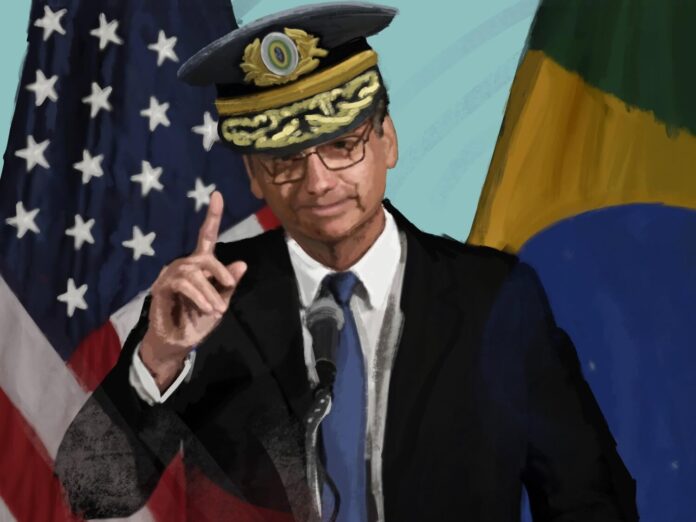On Oct. 2, Brazil held the first round of a presidential election described as “the biggest vote in decades,” which would determine whether the right-wing populist incumbent president Jair Bolsonaro would be reelected, or if he would be replaced by the leftist former president Luiz Inácio Lula da Silva (known as Lula). After the first round, Lula captured 48.4 percent of the vote, while Bolsonaro captured 43.2 percent, meaning the two will advance to a runoff election on Oct. 30.
Though Lula did not win the majority of votes required to take the election, the circumstances of this election provide a crucial template for understanding both the threat of an ascendant right wing in the U.S. and other countries, and how to properly fight back.
The current president, Bolsonaro, has an ardent love of the military dictatorship established in Brazil after the American-supported coup of João Goulart in 1964. The military regime saw the torture of many political dissidents — primarily left-wingers — and had the support of the U.S., which trained the military government in various torture techniques. Bolsonaro, a retired military officer himself, appointed a number of former and current military officials to civilian political posts — such as his current vice president Hamilton Murão.
While he was a deputy in Brazil’s lower house, Bolsonaro stated that the “only solution for Brazil would be a civil war” in response to the “dishonesty” of the administration of then-president Fernando Henrique Cardoso. Bolsonaro has also made a number of homophobic and misogynistic statements. While lashing out at former human rights minister Maria do Rosarío for praising a report on torture during Brazil’s military dictatorship, Bolsonaro said he “would not rape” her because she was “not worth it.” In another instance said that he was “incapable of loving a homosexual son.”
In addition to Bolsonaro’s admiration of authoritarian regimes and bigotry against women and LGBTQ people, he has more recently adopted features of the global right wing similar to that of the U.S. — just as with Donald Trump, he bungled the response to the COVID-19 pandemic, contributing to tens of thousands of unnecessary deaths, having fired his health minister early during the pandemic. Additionally, outside observers worried that rallies Bolsonaro held in 2021 were the prelude to a self-coup, similar to the attempted self-coup in the U.S. that culminated in the Jan. 6 insurrection.
Bolsonaro’s opponent, Lula, was the president of Brazil as a member of the leftist Worker’s Party (PT) from 2003 to 2010, during which he presided over an economic expansion that lifted tens of millions out of poverty. Despite his popularity, Lula was also caught up in numerous corruption scandals, culminating in his conviction during a large-scale corruption investigation known as Operation Car Wash and rendering him ineligible to run in 2018. However, in 2021, Lula had his convictions annulled, meaning he was able to run in this year’s election and properly confront the fascist threat Bolsonaro represented.
What makes Lula’s run against Bolsonaro special is that he did not take on a bomb-throwing, anti-coalitional form of politics. Some surely may have lamented that he chose the centrist, “pro-business” former governor of São Paulo, Geraldo Ackmin, as his running mate, but it is precisely this choice that made his ticket appealing to a wide variety of people. A candidacy that isolates the center to center-left will not succeed against the right-wing authoritarian movement that Bolsonaro is the head of. Going into the runoff election, it is tantamount for Lula to present as broad a political tent as possible — he cannot win against Bolsonaro by assuming that a strongly left view has a majority.
Of course, Brazil is not the only country staring down the threat of a right-wing authoritarian movement — the U.S.’s Republican Party is increasingly a right-wing authoritarian one, while Sweden has the nativist and white supremacist Sweden Democrats. The latter are likely to strongly influence the incoming center-right government, as the centrist Liberal party will likely support the center-right Moderate party in their government. This cannot stand — if the Moderates in Sweden cared about keeping the country as an open and free society, they would not, under any circumstances, have allowed the Sweden Democrats to have any modicum of influence.
Centrists and liberals in America must avoid this fate — even if it means allying with people who have opposing views on economic policies. Similarly, left-wing candidates would do well to understand that the enemy is not economic liberals, but right-wing authoritarianism, and would do well to accept people who are less economically interventionist into their governing coalition. Though this arrangement is certainly distasteful for both sides, it is much better than the alternative — a fascist party with the strongman authoritarianism of Bolsonaro and the nativism of the Sweden Democrats. Down with right-wing fascism, up with the left-liberal popular front.
Contact Avinash Iyer at iyera@oxy.edu.
![]()































